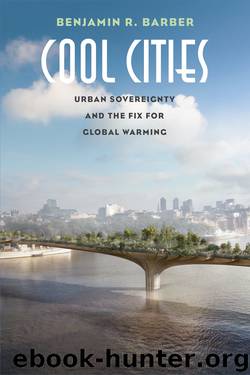Cool Cities: The Urban Fix for Global Warming by Benjamin R. Barber

Author:Benjamin R. Barber [Barber, Benjamin R.]
Language: eng
Format: epub
Tags: Political Science, Public Policy, City Planning & Urban Development, Environmental Policy, science, Global Warming & Climate Change
ISBN: 9780300224207
Google: EqqODgAAQBAJ
Amazon: 0300224206
Publisher: Yale University Press
Published: 2017-01-15T00:40:29.662000+00:00
12
City Sovereignty and the Need for
Urban Networks
The Compact of Mayors launched at the United Nations Climate Summit in 2014 engaged “the world’s largest coalition of city leaders addressing climate change by pledging to reduce their greenhouse gas emissions, tracking their progress, and preparing for the impacts of climate change.” Eighty-four cities, with more than a quarter of a billion in total population, initially signed on, undergirded by such key networks as ICLEI, the C40 Climate Cities, the UCLG, and the Rockefeller Foundation’s newly launched 100 Resilient Cities program. These and other networks fostered support for the global climate agreement reached at the COP 21 meeting at the end of 2015.1 The next year, the European Union’s Committee on the Regions added an Urban Agenda and a “Pact of Amsterdam” to the emerging consensus on the core role cities must now play in grappling with climate change, refugees, pandemic disease, terrorism, and global inequality.
These urban networks, though sometimes diverted by the politics of turf, are committed to a common mission—to get member cities to meet specific climate goals and environmental standards as a starting point for cooperation and common action—which requires their concerted effort if it is to be realized. But even with the most robust cooperation, cities in these networks have lacked sufficient jurisdictional autonomy and resources to be able to forge common policies across national borders. By themselves, cities and networks can only do so much. They are far too often prevented by national governmental policies from engaging in cross-border common action. Richard Schragger has argued that at least in the United States, “the vertical separation of powers . . . does not promote city power; it limits it,” and that “if one favors decentralization, federalism as practiced in the U.S. is not the way to get it.”2 However, while cities have yet to flex their municipal muscles to secure the political mandate that will afford them the transnational authority and legitimacy to act collectively in place of their inert but still sovereign mother nations, their right to do so is increasingly evident.
Unfortunately, national dysfunction has not necessarily led to national modesty. As Michael Bloomberg has said with respect to sourcing energy, countries must “empower their cities to achieve [environmental] goals by freeing them to regulate their own power supplies.” Cities need to be freed to take common action where states fail to act, as they so often do. In Bloomberg’s derisive formulation, “federal legislators, as usual, are way behind the curve—laughably setting goals for some far off time when they’ll all be dead and can’t be held accountable!” Bloomberg’s successor, Mayor Bill de Blasio, goes even further: “when national governments fail to act on crucial issues like climate change, cities have to do so.” But to do so, they need to act in concert through a global political authority—which is the whole point of the Global Parliament of Mayors. In a task as “monumental as it is essential,” Bloomberg adds, the new “Metropolitan Generation” will be required to “build modern cities for a new urban civilization.
Download
This site does not store any files on its server. We only index and link to content provided by other sites. Please contact the content providers to delete copyright contents if any and email us, we'll remove relevant links or contents immediately.
The Secret History by Donna Tartt(16611)
The Social Justice Warrior Handbook by Lisa De Pasquale(11486)
Thirteen Reasons Why by Jay Asher(7783)
This Is How You Lose Her by Junot Diaz(5754)
Weapons of Math Destruction by Cathy O'Neil(5032)
Zero to One by Peter Thiel(4818)
The Myth of the Strong Leader by Archie Brown(4786)
Promise Me, Dad by Joe Biden(4441)
Stone's Rules by Roger Stone(4413)
Beartown by Fredrik Backman(4405)
How Democracies Die by Steven Levitsky & Daniel Ziblatt(4393)
The Fire Next Time by James Baldwin(4338)
100 Deadly Skills by Clint Emerson(4072)
A Higher Loyalty: Truth, Lies, and Leadership by James Comey(4027)
Rise and Kill First by Ronen Bergman(4009)
The David Icke Guide to the Global Conspiracy (and how to end it) by David Icke(3876)
The Farm by Tom Rob Smith(3870)
Secrecy World by Jake Bernstein(3774)
The Doomsday Machine by Daniel Ellsberg(3726)
